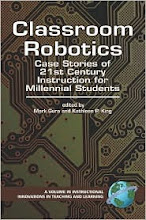"Coming soon to some S.C. classrooms: An army of robots to help autistic students learn social skills
Milo's rubbery face stretches into a lifelike smile. His eyes pivot from side to side. His arms gesture, and his voice box activates.
Milo is an educational robot, and 21 of his kind are fanning out across South Carolina as part of an effort to teach social and emotional skills to students with autism.Read the full article at its source: https://www.southstrandnews.com/news/coming-soon-to-some-s-c-classrooms-an-army-of-robots-to-help-autistic-students/article_40a4d3d2-a79d-11e7-adf4-431f8e5e1040.html
"There are children who will talk to Milo who may not speak to a human, even their parents," said S.C. Education Superintendent Molly Spearman. "It’s just a fantastic tool that we’re putting in the hands of therapists and teachers across the state."
The S.C. Department of Education bought the doll-like, foot-tall robots and accompanying curriculum from the Dallas-based educational technology company RoboKind, which sells devices under the brand name Robots4Autism. The department anticipates spending between $250,000 and $300,000 to test the program over three years. The money will come from the federal Individuals with Disabilities Education Act.
The state has trained educators and will send robots to the following school districts: Anderson 1, Beaufort, Charleston, Colleton, Florence 1, Greenwood 50, Horry, Kershaw, Marion, Orangeburg 5, Pickens, Richland One, Spartanburg 6 and Sumter.
Autism spectrum disorder is a range of developmental characteristics that can lead to difficulty interpreting social cues, intense focus on narrow interests, repetitive behavior and difficulty speaking. The Centers for Disease Control and Prevention estimate that one in 68 children has been diagnosed with ASD. That number has been on the rise in recent years, partly due to advances in diagnosis.
The first known therapeutic use of a robot to help an autistic child took place in 1976 when
Massachusetts Institute of Technology researchers used a turtle-like device to encourage a 7-year-old boy to speak.
Robotic devices have become cheaper and more ubiquitous in the 21st century, with several companies marketing them to school systems.
Academic journals have published case studies since 2004 on their usefulness for children on the spectrum. While early results were promising, scholars concluded that more in-depth research is necessary. Some initial studies were funded by RoboKind, while others were independent.
One exploratory study, conducted by Canadian researchers and published in the journal Autonomous Robots in 2007, looked at four students with autism. It found that while they were more likely to imitate body movements performed by a human mediator, they were more likely to imitate facial expressions like smiling from a robotic mediator.
Education Department Associate Lisa Raiford, who specializes in services for students with autism, emphasized that Milo is a tool, not a replacement for human educators.
"It does not operate in the absence of a teacher or therapist," Raiford said. "You’re not sitting a child in front of a robot and letting them go."
State officials began training local educators through the Robots4Autism initiative last week. In the Charleston County School District the device will be used at one elementary school once teachers there have received training. Assistant Executive Director of Exceptional Children Madeline Jacobs said she hopes to use the device for social and emotional training.
Milo is programmed to speak slower than the average teacher and can walk, dance and carry out simple conversations with students — not unlike the Siri artificial-intelligence app included on iPhones.
"Education is evolving. We have to change what we’re doing as adults to meet kids’ needs," Jacobs said.
Spearman admits the robots can be a little creepy, especially en masse. After unwrapping all of the Milos and placing them on a table in the department's Columbia office, she said a colleague turned them all off and heard each one say, "Goodbye, I'm leaving now."
"He said he about freaked out," Spearman said.



No comments:
Post a Comment